 The LASIK procedure offers many benefits to patients that have nearsightedness, farsightedness, and astigmatism. It can significantly improve vision within one day of treatment; the treatment is permanent, reducing or eliminating patients’ need for contact lenses and glasses; and it results in few side effects and complications. LASIK surgery can be safely performed on most patients, but there are certain factors that may preclude some from being good candidates for this particular procedure. At TLC Tysons Corner, my team and I will perform a comprehensive LASIK screening before surgery to determine if LASIK, or an alternative refractive treatment, is best suited to your unique needs.
The LASIK procedure offers many benefits to patients that have nearsightedness, farsightedness, and astigmatism. It can significantly improve vision within one day of treatment; the treatment is permanent, reducing or eliminating patients’ need for contact lenses and glasses; and it results in few side effects and complications. LASIK surgery can be safely performed on most patients, but there are certain factors that may preclude some from being good candidates for this particular procedure. At TLC Tysons Corner, my team and I will perform a comprehensive LASIK screening before surgery to determine if LASIK, or an alternative refractive treatment, is best suited to your unique needs.
As a board certified ophthalmologist, I will never sacrifice the safety of my patients by recommending LASIK to someone that is not an appropriate candidate for the procedure. You are not a good candidate for LASIK, but may be able to undergo alternative refractive surgery treatments, if you have:
- Thin corneas
- Corneal scarring
- A history of dry eye
- A high degree of refractive errors
- Large pupils
PRK
Before LASIK was introduced to the market, PRK was the prevailing refractive surgery option. LASIK is generally considered superior to PRK because it results in a less painful and shorter recovery period. However, PRK surgery can be an excellent option for patients looking for an alternative to LASIK.
PRK and LASIK surgery are similar procedures. The main difference lies in the way that the underlying layers of the cornea are exposed to the excimer laser.
- PRK:In PRK surgery, the epithelium (the outermost layer of the cornea) is removed. The excimer laser is then used to reshape the cornea. Next, bandage contact lenses are placed over the eyes to help the epithelial layer regenerate on its own.
- LASIK:During LASIK, a flap is made in the outer corneal tissue using a microkeratome or laser. The excimer laser reshapes the cornea, and then the corneal flap is closed. LASIK patients are not required to wear special contact lenses after surgery, as the cornea will quickly heal on its own.
LASIK and PRK produce excellent visual results in patients. Most of my Virginia LASIK patients experience clear vision within several hours of treatment, while PRK patients experience improved sight within three to five days.
ICLs
ICLs refer to implantable contact lenses, also known as permanent contact lenses. This refractive surgery option differs greatly from laser vision correction procedures such as LASIK and PRK, which involve the removal of corneal tissue. ICLs are devices that work with your eyes natural lens to produce clear vision at all distances. During surgery, a small incision is created in the eye, and then the ICL is placed in front of the eye’s natural lens. Depending on the type of lens that is implanted, the incision may be allowed to self-heal or it will be closed with dissolvable sutures. Patients that undergo ICL surgery typically achieve improved vision within a day.
LASIK surgery is associated with a rapid healing period, minimal pain, and a low risk of post-surgical complications. However, if you are not an appropriate candidate for LASIK, there are alternative treatment options available. Contact TLC Tysons Corner today to schedule a consultation with us and find out which refractive surgery procedures are right for you.



